Literature Review: Analyzing Olympic Games' Impact on Hotel Industry
VerifiedAdded on 2023/06/12
|24
|7287
|108
Literature Review
AI Summary
This literature review delves into the impact of mega-events, specifically the Olympic Games, on the hotel industry. It examines the history of the Olympic Games and its evolution into a modern mega-event, highlighting the increasing participation and economic benefits for host countries. The review analyzes the impact on the hotel industry through various metrics such as occupancy rate, average daily rate, and revenue per available room. It traces the history of the Olympic Games' influence on the hotel industry, noting how hosting the games has led to infrastructure development and improved facilities. The review concludes by identifying areas that warrant further research, including the negative social, cultural, and environmental impacts of the Olympic Games on the hotel industry.
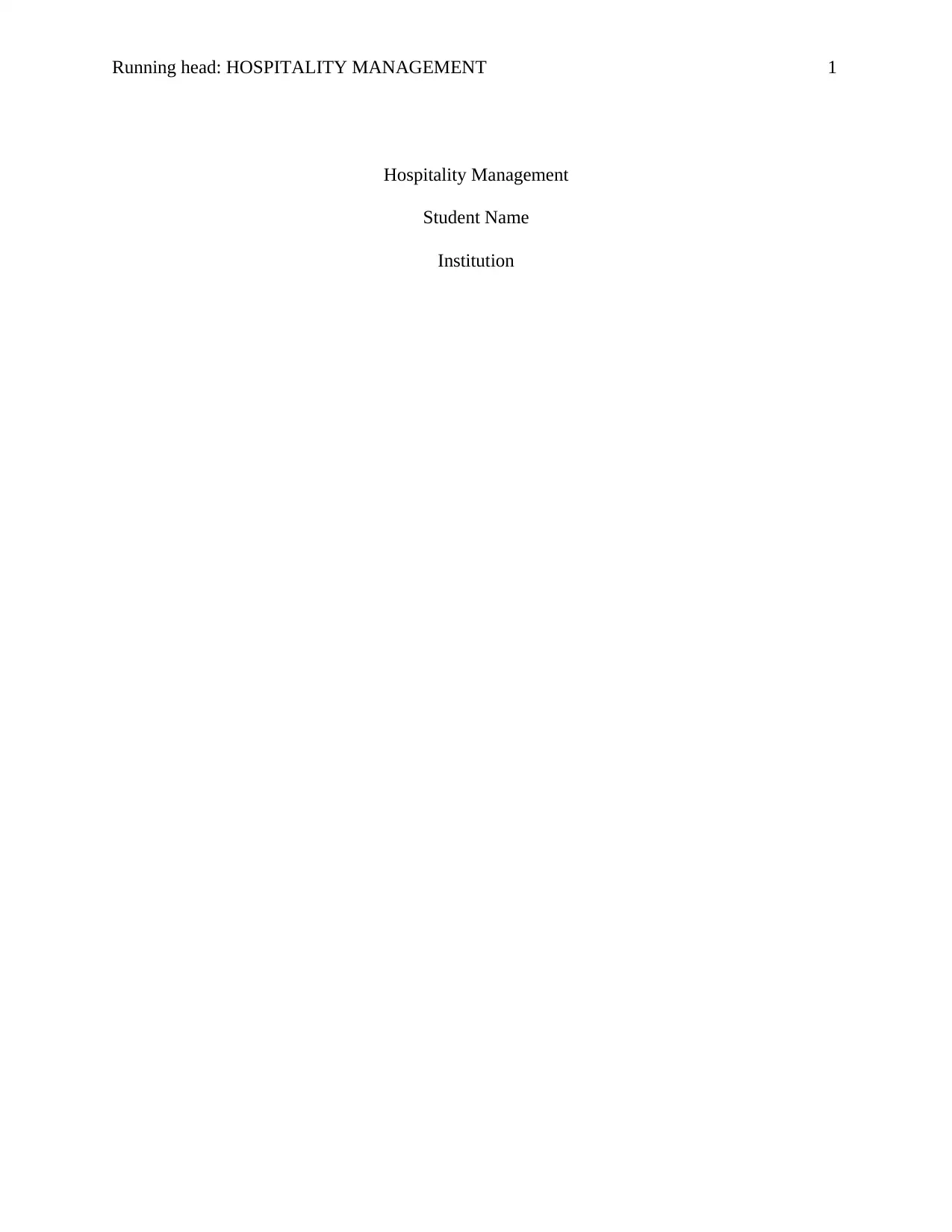
Running head: HOSPITALITY MANAGEMENT 1
Hospitality Management
Student Name
Institution
Hospitality Management
Student Name
Institution
Paraphrase This Document
Need a fresh take? Get an instant paraphrase of this document with our AI Paraphraser
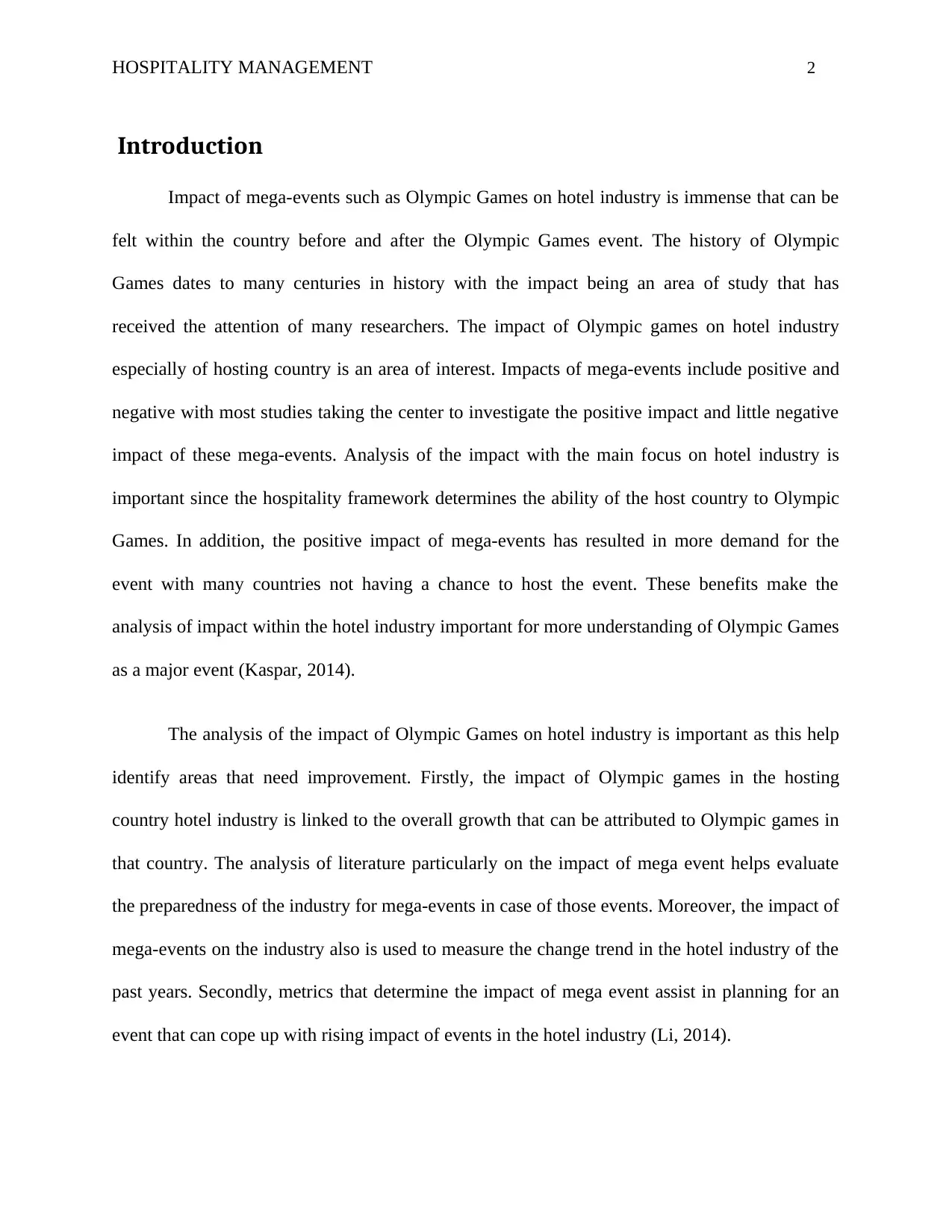
HOSPITALITY MANAGEMENT 2
Introduction
Impact of mega-events such as Olympic Games on hotel industry is immense that can be
felt within the country before and after the Olympic Games event. The history of Olympic
Games dates to many centuries in history with the impact being an area of study that has
received the attention of many researchers. The impact of Olympic games on hotel industry
especially of hosting country is an area of interest. Impacts of mega-events include positive and
negative with most studies taking the center to investigate the positive impact and little negative
impact of these mega-events. Analysis of the impact with the main focus on hotel industry is
important since the hospitality framework determines the ability of the host country to Olympic
Games. In addition, the positive impact of mega-events has resulted in more demand for the
event with many countries not having a chance to host the event. These benefits make the
analysis of impact within the hotel industry important for more understanding of Olympic Games
as a major event (Kaspar, 2014).
The analysis of the impact of Olympic Games on hotel industry is important as this help
identify areas that need improvement. Firstly, the impact of Olympic games in the hosting
country hotel industry is linked to the overall growth that can be attributed to Olympic games in
that country. The analysis of literature particularly on the impact of mega event helps evaluate
the preparedness of the industry for mega-events in case of those events. Moreover, the impact of
mega-events on the industry also is used to measure the change trend in the hotel industry of the
past years. Secondly, metrics that determine the impact of mega event assist in planning for an
event that can cope up with rising impact of events in the hotel industry (Li, 2014).
Introduction
Impact of mega-events such as Olympic Games on hotel industry is immense that can be
felt within the country before and after the Olympic Games event. The history of Olympic
Games dates to many centuries in history with the impact being an area of study that has
received the attention of many researchers. The impact of Olympic games on hotel industry
especially of hosting country is an area of interest. Impacts of mega-events include positive and
negative with most studies taking the center to investigate the positive impact and little negative
impact of these mega-events. Analysis of the impact with the main focus on hotel industry is
important since the hospitality framework determines the ability of the host country to Olympic
Games. In addition, the positive impact of mega-events has resulted in more demand for the
event with many countries not having a chance to host the event. These benefits make the
analysis of impact within the hotel industry important for more understanding of Olympic Games
as a major event (Kaspar, 2014).
The analysis of the impact of Olympic Games on hotel industry is important as this help
identify areas that need improvement. Firstly, the impact of Olympic games in the hosting
country hotel industry is linked to the overall growth that can be attributed to Olympic games in
that country. The analysis of literature particularly on the impact of mega event helps evaluate
the preparedness of the industry for mega-events in case of those events. Moreover, the impact of
mega-events on the industry also is used to measure the change trend in the hotel industry of the
past years. Secondly, metrics that determine the impact of mega event assist in planning for an
event that can cope up with rising impact of events in the hotel industry (Li, 2014).
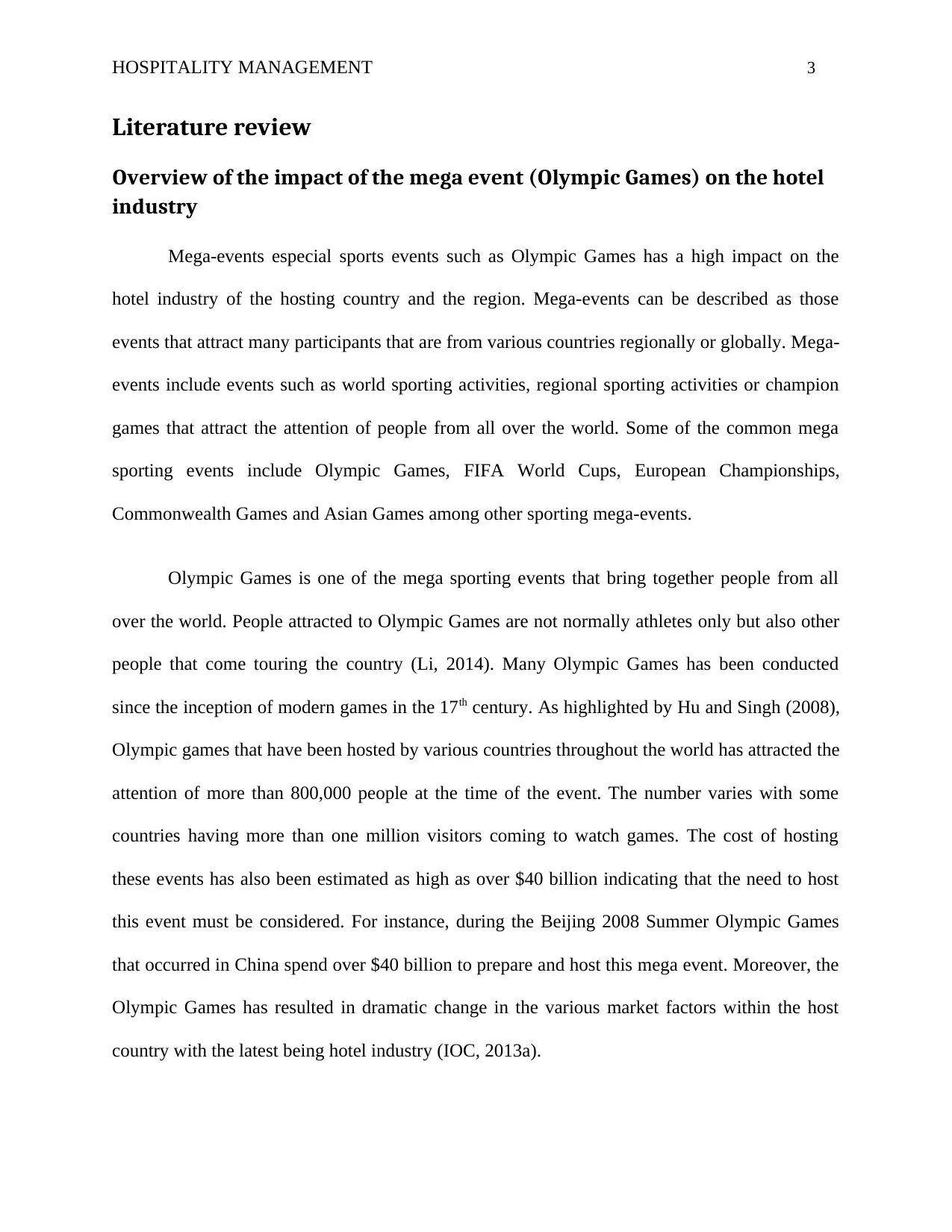
HOSPITALITY MANAGEMENT 3
Literature review
Overview of the impact of the mega event (Olympic Games) on the hotel
industry
Mega-events especial sports events such as Olympic Games has a high impact on the
hotel industry of the hosting country and the region. Mega-events can be described as those
events that attract many participants that are from various countries regionally or globally. Mega-
events include events such as world sporting activities, regional sporting activities or champion
games that attract the attention of people from all over the world. Some of the common mega
sporting events include Olympic Games, FIFA World Cups, European Championships,
Commonwealth Games and Asian Games among other sporting mega-events.
Olympic Games is one of the mega sporting events that bring together people from all
over the world. People attracted to Olympic Games are not normally athletes only but also other
people that come touring the country (Li, 2014). Many Olympic Games has been conducted
since the inception of modern games in the 17th century. As highlighted by Hu and Singh (2008),
Olympic games that have been hosted by various countries throughout the world has attracted the
attention of more than 800,000 people at the time of the event. The number varies with some
countries having more than one million visitors coming to watch games. The cost of hosting
these events has also been estimated as high as over $40 billion indicating that the need to host
this event must be considered. For instance, during the Beijing 2008 Summer Olympic Games
that occurred in China spend over $40 billion to prepare and host this mega event. Moreover, the
Olympic Games has resulted in dramatic change in the various market factors within the host
country with the latest being hotel industry (IOC, 2013a).
Literature review
Overview of the impact of the mega event (Olympic Games) on the hotel
industry
Mega-events especial sports events such as Olympic Games has a high impact on the
hotel industry of the hosting country and the region. Mega-events can be described as those
events that attract many participants that are from various countries regionally or globally. Mega-
events include events such as world sporting activities, regional sporting activities or champion
games that attract the attention of people from all over the world. Some of the common mega
sporting events include Olympic Games, FIFA World Cups, European Championships,
Commonwealth Games and Asian Games among other sporting mega-events.
Olympic Games is one of the mega sporting events that bring together people from all
over the world. People attracted to Olympic Games are not normally athletes only but also other
people that come touring the country (Li, 2014). Many Olympic Games has been conducted
since the inception of modern games in the 17th century. As highlighted by Hu and Singh (2008),
Olympic games that have been hosted by various countries throughout the world has attracted the
attention of more than 800,000 people at the time of the event. The number varies with some
countries having more than one million visitors coming to watch games. The cost of hosting
these events has also been estimated as high as over $40 billion indicating that the need to host
this event must be considered. For instance, during the Beijing 2008 Summer Olympic Games
that occurred in China spend over $40 billion to prepare and host this mega event. Moreover, the
Olympic Games has resulted in dramatic change in the various market factors within the host
country with the latest being hotel industry (IOC, 2013a).
⊘ This is a preview!⊘
Do you want full access?
Subscribe today to unlock all pages.

Trusted by 1+ million students worldwide
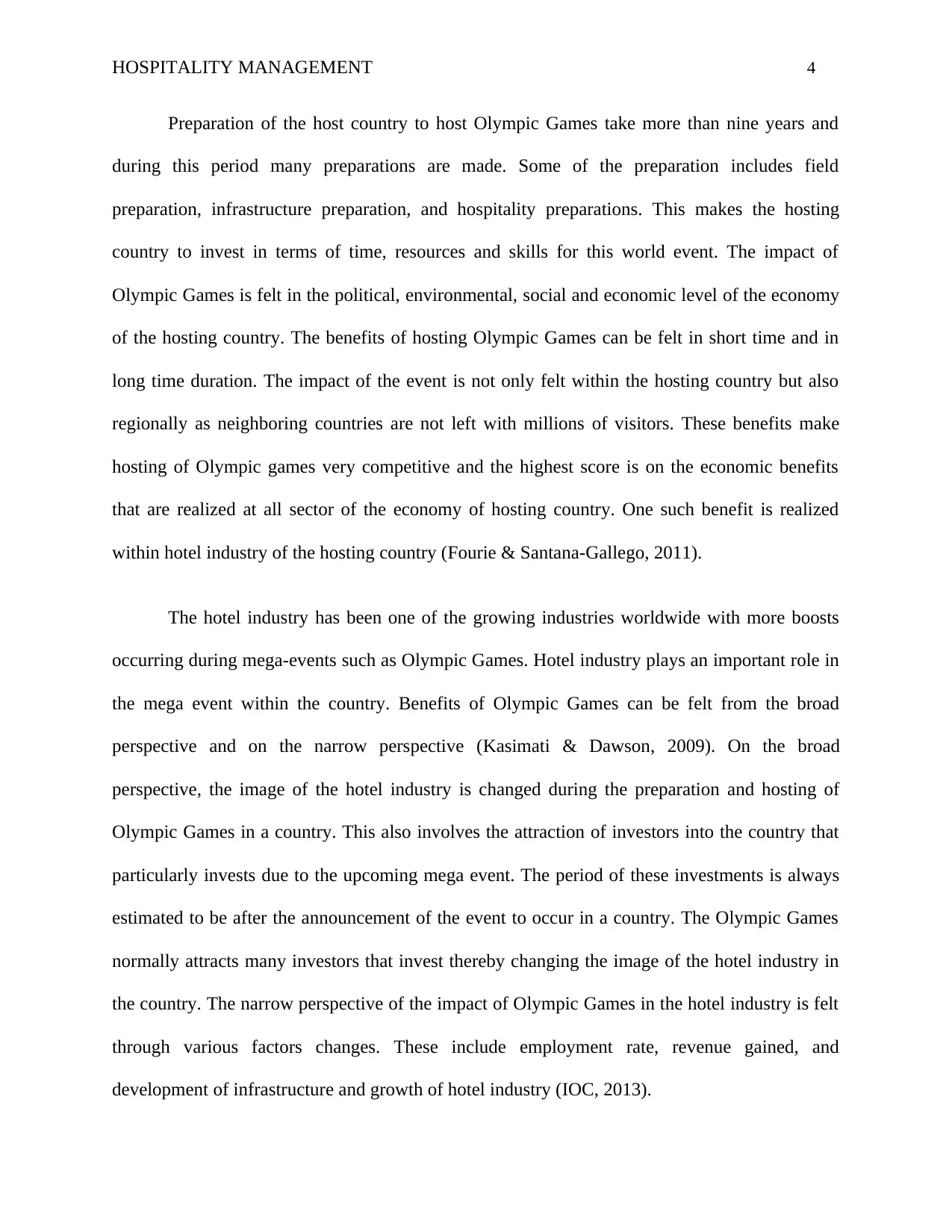
HOSPITALITY MANAGEMENT 4
Preparation of the host country to host Olympic Games take more than nine years and
during this period many preparations are made. Some of the preparation includes field
preparation, infrastructure preparation, and hospitality preparations. This makes the hosting
country to invest in terms of time, resources and skills for this world event. The impact of
Olympic Games is felt in the political, environmental, social and economic level of the economy
of the hosting country. The benefits of hosting Olympic Games can be felt in short time and in
long time duration. The impact of the event is not only felt within the hosting country but also
regionally as neighboring countries are not left with millions of visitors. These benefits make
hosting of Olympic games very competitive and the highest score is on the economic benefits
that are realized at all sector of the economy of hosting country. One such benefit is realized
within hotel industry of the hosting country (Fourie & Santana-Gallego, 2011).
The hotel industry has been one of the growing industries worldwide with more boosts
occurring during mega-events such as Olympic Games. Hotel industry plays an important role in
the mega event within the country. Benefits of Olympic Games can be felt from the broad
perspective and on the narrow perspective (Kasimati & Dawson, 2009). On the broad
perspective, the image of the hotel industry is changed during the preparation and hosting of
Olympic Games in a country. This also involves the attraction of investors into the country that
particularly invests due to the upcoming mega event. The period of these investments is always
estimated to be after the announcement of the event to occur in a country. The Olympic Games
normally attracts many investors that invest thereby changing the image of the hotel industry in
the country. The narrow perspective of the impact of Olympic Games in the hotel industry is felt
through various factors changes. These include employment rate, revenue gained, and
development of infrastructure and growth of hotel industry (IOC, 2013).
Preparation of the host country to host Olympic Games take more than nine years and
during this period many preparations are made. Some of the preparation includes field
preparation, infrastructure preparation, and hospitality preparations. This makes the hosting
country to invest in terms of time, resources and skills for this world event. The impact of
Olympic Games is felt in the political, environmental, social and economic level of the economy
of the hosting country. The benefits of hosting Olympic Games can be felt in short time and in
long time duration. The impact of the event is not only felt within the hosting country but also
regionally as neighboring countries are not left with millions of visitors. These benefits make
hosting of Olympic games very competitive and the highest score is on the economic benefits
that are realized at all sector of the economy of hosting country. One such benefit is realized
within hotel industry of the hosting country (Fourie & Santana-Gallego, 2011).
The hotel industry has been one of the growing industries worldwide with more boosts
occurring during mega-events such as Olympic Games. Hotel industry plays an important role in
the mega event within the country. Benefits of Olympic Games can be felt from the broad
perspective and on the narrow perspective (Kasimati & Dawson, 2009). On the broad
perspective, the image of the hotel industry is changed during the preparation and hosting of
Olympic Games in a country. This also involves the attraction of investors into the country that
particularly invests due to the upcoming mega event. The period of these investments is always
estimated to be after the announcement of the event to occur in a country. The Olympic Games
normally attracts many investors that invest thereby changing the image of the hotel industry in
the country. The narrow perspective of the impact of Olympic Games in the hotel industry is felt
through various factors changes. These include employment rate, revenue gained, and
development of infrastructure and growth of hotel industry (IOC, 2013).
Paraphrase This Document
Need a fresh take? Get an instant paraphrase of this document with our AI Paraphraser
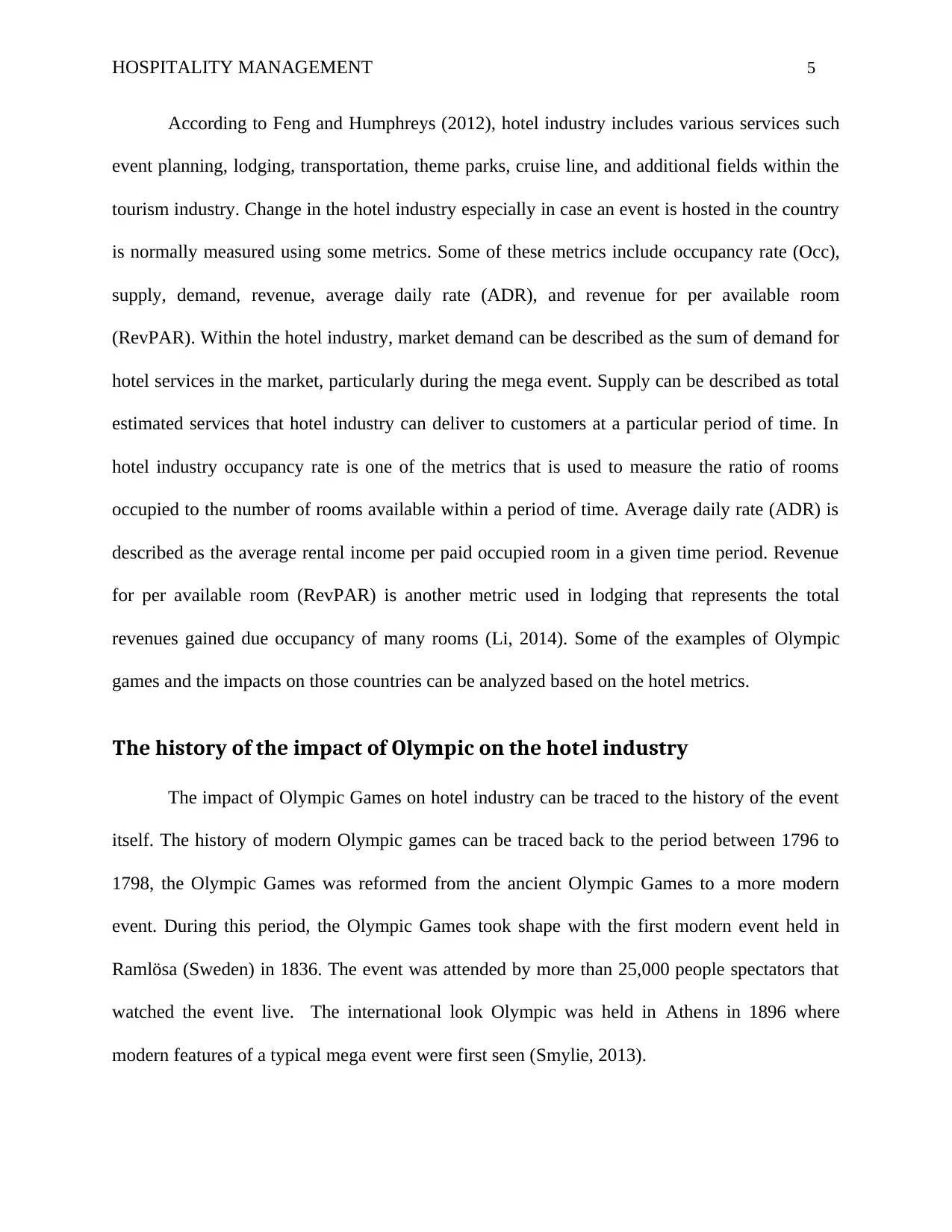
HOSPITALITY MANAGEMENT 5
According to Feng and Humphreys (2012), hotel industry includes various services such
event planning, lodging, transportation, theme parks, cruise line, and additional fields within the
tourism industry. Change in the hotel industry especially in case an event is hosted in the country
is normally measured using some metrics. Some of these metrics include occupancy rate (Occ),
supply, demand, revenue, average daily rate (ADR), and revenue for per available room
(RevPAR). Within the hotel industry, market demand can be described as the sum of demand for
hotel services in the market, particularly during the mega event. Supply can be described as total
estimated services that hotel industry can deliver to customers at a particular period of time. In
hotel industry occupancy rate is one of the metrics that is used to measure the ratio of rooms
occupied to the number of rooms available within a period of time. Average daily rate (ADR) is
described as the average rental income per paid occupied room in a given time period. Revenue
for per available room (RevPAR) is another metric used in lodging that represents the total
revenues gained due occupancy of many rooms (Li, 2014). Some of the examples of Olympic
games and the impacts on those countries can be analyzed based on the hotel metrics.
The history of the impact of Olympic on the hotel industry
The impact of Olympic Games on hotel industry can be traced to the history of the event
itself. The history of modern Olympic games can be traced back to the period between 1796 to
1798, the Olympic Games was reformed from the ancient Olympic Games to a more modern
event. During this period, the Olympic Games took shape with the first modern event held in
Ramlösa (Sweden) in 1836. The event was attended by more than 25,000 people spectators that
watched the event live. The international look Olympic was held in Athens in 1896 where
modern features of a typical mega event were first seen (Smylie, 2013).
According to Feng and Humphreys (2012), hotel industry includes various services such
event planning, lodging, transportation, theme parks, cruise line, and additional fields within the
tourism industry. Change in the hotel industry especially in case an event is hosted in the country
is normally measured using some metrics. Some of these metrics include occupancy rate (Occ),
supply, demand, revenue, average daily rate (ADR), and revenue for per available room
(RevPAR). Within the hotel industry, market demand can be described as the sum of demand for
hotel services in the market, particularly during the mega event. Supply can be described as total
estimated services that hotel industry can deliver to customers at a particular period of time. In
hotel industry occupancy rate is one of the metrics that is used to measure the ratio of rooms
occupied to the number of rooms available within a period of time. Average daily rate (ADR) is
described as the average rental income per paid occupied room in a given time period. Revenue
for per available room (RevPAR) is another metric used in lodging that represents the total
revenues gained due occupancy of many rooms (Li, 2014). Some of the examples of Olympic
games and the impacts on those countries can be analyzed based on the hotel metrics.
The history of the impact of Olympic on the hotel industry
The impact of Olympic Games on hotel industry can be traced to the history of the event
itself. The history of modern Olympic games can be traced back to the period between 1796 to
1798, the Olympic Games was reformed from the ancient Olympic Games to a more modern
event. During this period, the Olympic Games took shape with the first modern event held in
Ramlösa (Sweden) in 1836. The event was attended by more than 25,000 people spectators that
watched the event live. The international look Olympic was held in Athens in 1896 where
modern features of a typical mega event were first seen (Smylie, 2013).
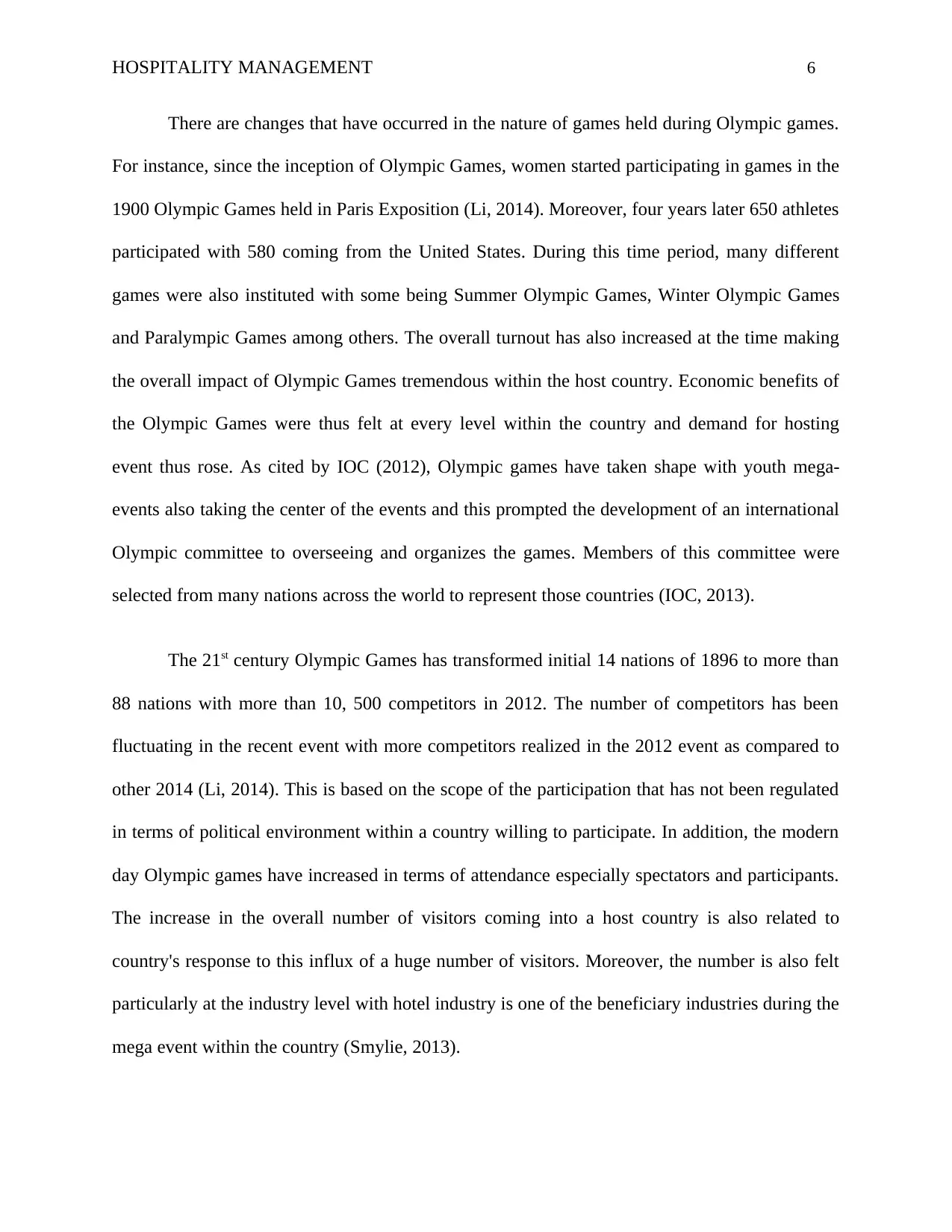
HOSPITALITY MANAGEMENT 6
There are changes that have occurred in the nature of games held during Olympic games.
For instance, since the inception of Olympic Games, women started participating in games in the
1900 Olympic Games held in Paris Exposition (Li, 2014). Moreover, four years later 650 athletes
participated with 580 coming from the United States. During this time period, many different
games were also instituted with some being Summer Olympic Games, Winter Olympic Games
and Paralympic Games among others. The overall turnout has also increased at the time making
the overall impact of Olympic Games tremendous within the host country. Economic benefits of
the Olympic Games were thus felt at every level within the country and demand for hosting
event thus rose. As cited by IOC (2012), Olympic games have taken shape with youth mega-
events also taking the center of the events and this prompted the development of an international
Olympic committee to overseeing and organizes the games. Members of this committee were
selected from many nations across the world to represent those countries (IOC, 2013).
The 21st century Olympic Games has transformed initial 14 nations of 1896 to more than
88 nations with more than 10, 500 competitors in 2012. The number of competitors has been
fluctuating in the recent event with more competitors realized in the 2012 event as compared to
other 2014 (Li, 2014). This is based on the scope of the participation that has not been regulated
in terms of political environment within a country willing to participate. In addition, the modern
day Olympic games have increased in terms of attendance especially spectators and participants.
The increase in the overall number of visitors coming into a host country is also related to
country's response to this influx of a huge number of visitors. Moreover, the number is also felt
particularly at the industry level with hotel industry is one of the beneficiary industries during the
mega event within the country (Smylie, 2013).
There are changes that have occurred in the nature of games held during Olympic games.
For instance, since the inception of Olympic Games, women started participating in games in the
1900 Olympic Games held in Paris Exposition (Li, 2014). Moreover, four years later 650 athletes
participated with 580 coming from the United States. During this time period, many different
games were also instituted with some being Summer Olympic Games, Winter Olympic Games
and Paralympic Games among others. The overall turnout has also increased at the time making
the overall impact of Olympic Games tremendous within the host country. Economic benefits of
the Olympic Games were thus felt at every level within the country and demand for hosting
event thus rose. As cited by IOC (2012), Olympic games have taken shape with youth mega-
events also taking the center of the events and this prompted the development of an international
Olympic committee to overseeing and organizes the games. Members of this committee were
selected from many nations across the world to represent those countries (IOC, 2013).
The 21st century Olympic Games has transformed initial 14 nations of 1896 to more than
88 nations with more than 10, 500 competitors in 2012. The number of competitors has been
fluctuating in the recent event with more competitors realized in the 2012 event as compared to
other 2014 (Li, 2014). This is based on the scope of the participation that has not been regulated
in terms of political environment within a country willing to participate. In addition, the modern
day Olympic games have increased in terms of attendance especially spectators and participants.
The increase in the overall number of visitors coming into a host country is also related to
country's response to this influx of a huge number of visitors. Moreover, the number is also felt
particularly at the industry level with hotel industry is one of the beneficiary industries during the
mega event within the country (Smylie, 2013).
⊘ This is a preview!⊘
Do you want full access?
Subscribe today to unlock all pages.

Trusted by 1+ million students worldwide
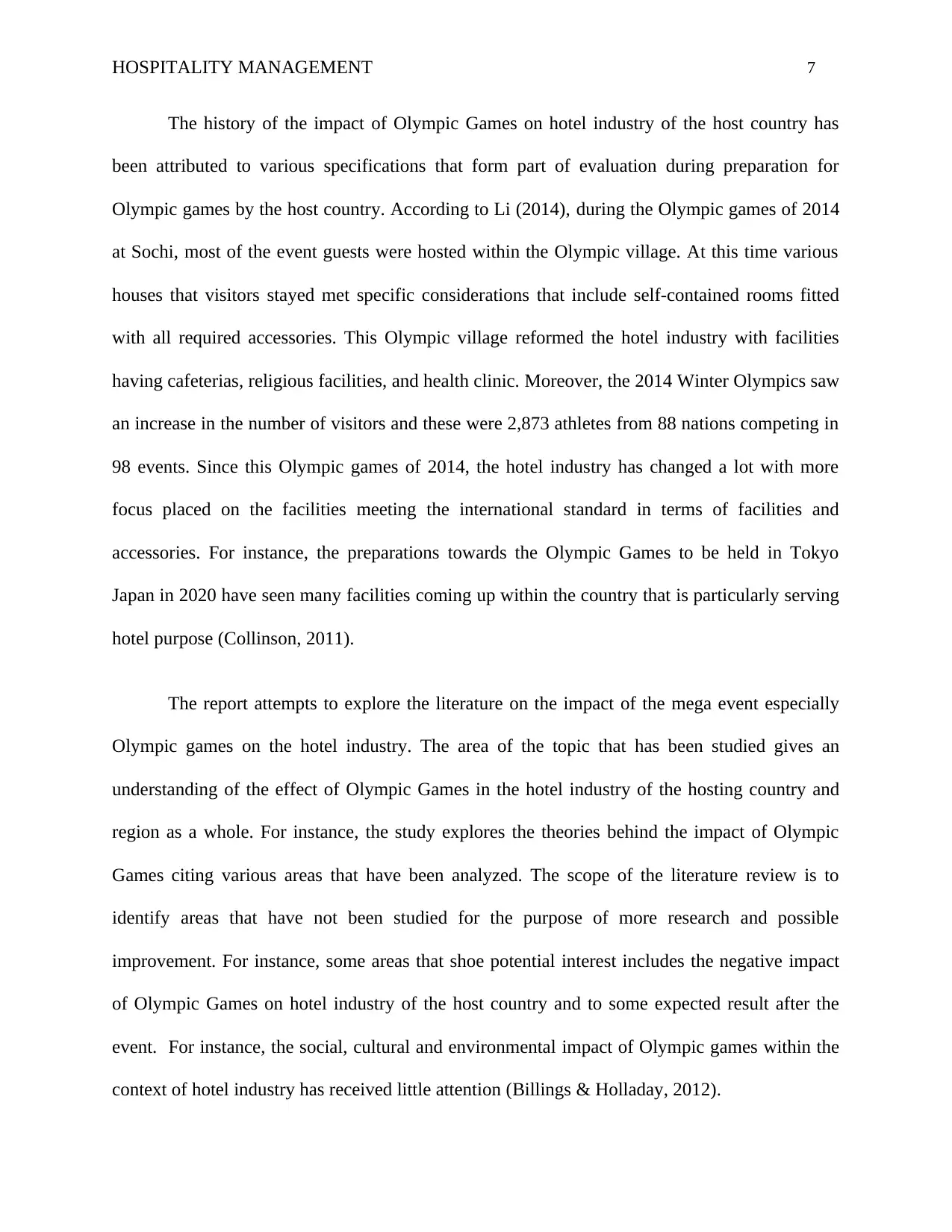
HOSPITALITY MANAGEMENT 7
The history of the impact of Olympic Games on hotel industry of the host country has
been attributed to various specifications that form part of evaluation during preparation for
Olympic games by the host country. According to Li (2014), during the Olympic games of 2014
at Sochi, most of the event guests were hosted within the Olympic village. At this time various
houses that visitors stayed met specific considerations that include self-contained rooms fitted
with all required accessories. This Olympic village reformed the hotel industry with facilities
having cafeterias, religious facilities, and health clinic. Moreover, the 2014 Winter Olympics saw
an increase in the number of visitors and these were 2,873 athletes from 88 nations competing in
98 events. Since this Olympic games of 2014, the hotel industry has changed a lot with more
focus placed on the facilities meeting the international standard in terms of facilities and
accessories. For instance, the preparations towards the Olympic Games to be held in Tokyo
Japan in 2020 have seen many facilities coming up within the country that is particularly serving
hotel purpose (Collinson, 2011).
The report attempts to explore the literature on the impact of the mega event especially
Olympic games on the hotel industry. The area of the topic that has been studied gives an
understanding of the effect of Olympic Games in the hotel industry of the hosting country and
region as a whole. For instance, the study explores the theories behind the impact of Olympic
Games citing various areas that have been analyzed. The scope of the literature review is to
identify areas that have not been studied for the purpose of more research and possible
improvement. For instance, some areas that shoe potential interest includes the negative impact
of Olympic Games on hotel industry of the host country and to some expected result after the
event. For instance, the social, cultural and environmental impact of Olympic games within the
context of hotel industry has received little attention (Billings & Holladay, 2012).
The history of the impact of Olympic Games on hotel industry of the host country has
been attributed to various specifications that form part of evaluation during preparation for
Olympic games by the host country. According to Li (2014), during the Olympic games of 2014
at Sochi, most of the event guests were hosted within the Olympic village. At this time various
houses that visitors stayed met specific considerations that include self-contained rooms fitted
with all required accessories. This Olympic village reformed the hotel industry with facilities
having cafeterias, religious facilities, and health clinic. Moreover, the 2014 Winter Olympics saw
an increase in the number of visitors and these were 2,873 athletes from 88 nations competing in
98 events. Since this Olympic games of 2014, the hotel industry has changed a lot with more
focus placed on the facilities meeting the international standard in terms of facilities and
accessories. For instance, the preparations towards the Olympic Games to be held in Tokyo
Japan in 2020 have seen many facilities coming up within the country that is particularly serving
hotel purpose (Collinson, 2011).
The report attempts to explore the literature on the impact of the mega event especially
Olympic games on the hotel industry. The area of the topic that has been studied gives an
understanding of the effect of Olympic Games in the hotel industry of the hosting country and
region as a whole. For instance, the study explores the theories behind the impact of Olympic
Games citing various areas that have been analyzed. The scope of the literature review is to
identify areas that have not been studied for the purpose of more research and possible
improvement. For instance, some areas that shoe potential interest includes the negative impact
of Olympic Games on hotel industry of the host country and to some expected result after the
event. For instance, the social, cultural and environmental impact of Olympic games within the
context of hotel industry has received little attention (Billings & Holladay, 2012).
Paraphrase This Document
Need a fresh take? Get an instant paraphrase of this document with our AI Paraphraser
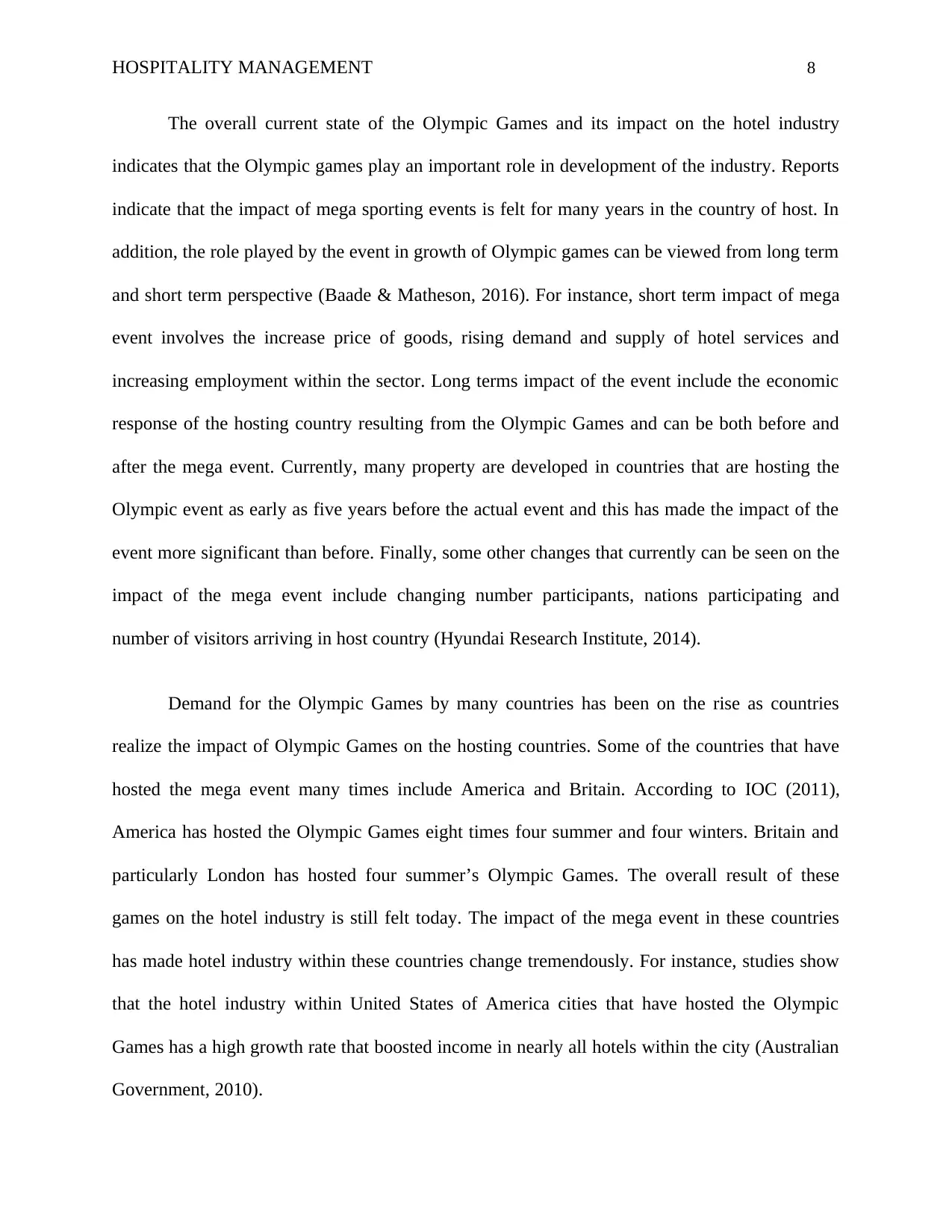
HOSPITALITY MANAGEMENT 8
The overall current state of the Olympic Games and its impact on the hotel industry
indicates that the Olympic games play an important role in development of the industry. Reports
indicate that the impact of mega sporting events is felt for many years in the country of host. In
addition, the role played by the event in growth of Olympic games can be viewed from long term
and short term perspective (Baade & Matheson, 2016). For instance, short term impact of mega
event involves the increase price of goods, rising demand and supply of hotel services and
increasing employment within the sector. Long terms impact of the event include the economic
response of the hosting country resulting from the Olympic Games and can be both before and
after the mega event. Currently, many property are developed in countries that are hosting the
Olympic event as early as five years before the actual event and this has made the impact of the
event more significant than before. Finally, some other changes that currently can be seen on the
impact of the mega event include changing number participants, nations participating and
number of visitors arriving in host country (Hyundai Research Institute, 2014).
Demand for the Olympic Games by many countries has been on the rise as countries
realize the impact of Olympic Games on the hosting countries. Some of the countries that have
hosted the mega event many times include America and Britain. According to IOC (2011),
America has hosted the Olympic Games eight times four summer and four winters. Britain and
particularly London has hosted four summer’s Olympic Games. The overall result of these
games on the hotel industry is still felt today. The impact of the mega event in these countries
has made hotel industry within these countries change tremendously. For instance, studies show
that the hotel industry within United States of America cities that have hosted the Olympic
Games has a high growth rate that boosted income in nearly all hotels within the city (Australian
Government, 2010).
The overall current state of the Olympic Games and its impact on the hotel industry
indicates that the Olympic games play an important role in development of the industry. Reports
indicate that the impact of mega sporting events is felt for many years in the country of host. In
addition, the role played by the event in growth of Olympic games can be viewed from long term
and short term perspective (Baade & Matheson, 2016). For instance, short term impact of mega
event involves the increase price of goods, rising demand and supply of hotel services and
increasing employment within the sector. Long terms impact of the event include the economic
response of the hosting country resulting from the Olympic Games and can be both before and
after the mega event. Currently, many property are developed in countries that are hosting the
Olympic event as early as five years before the actual event and this has made the impact of the
event more significant than before. Finally, some other changes that currently can be seen on the
impact of the mega event include changing number participants, nations participating and
number of visitors arriving in host country (Hyundai Research Institute, 2014).
Demand for the Olympic Games by many countries has been on the rise as countries
realize the impact of Olympic Games on the hosting countries. Some of the countries that have
hosted the mega event many times include America and Britain. According to IOC (2011),
America has hosted the Olympic Games eight times four summer and four winters. Britain and
particularly London has hosted four summer’s Olympic Games. The overall result of these
games on the hotel industry is still felt today. The impact of the mega event in these countries
has made hotel industry within these countries change tremendously. For instance, studies show
that the hotel industry within United States of America cities that have hosted the Olympic
Games has a high growth rate that boosted income in nearly all hotels within the city (Australian
Government, 2010).
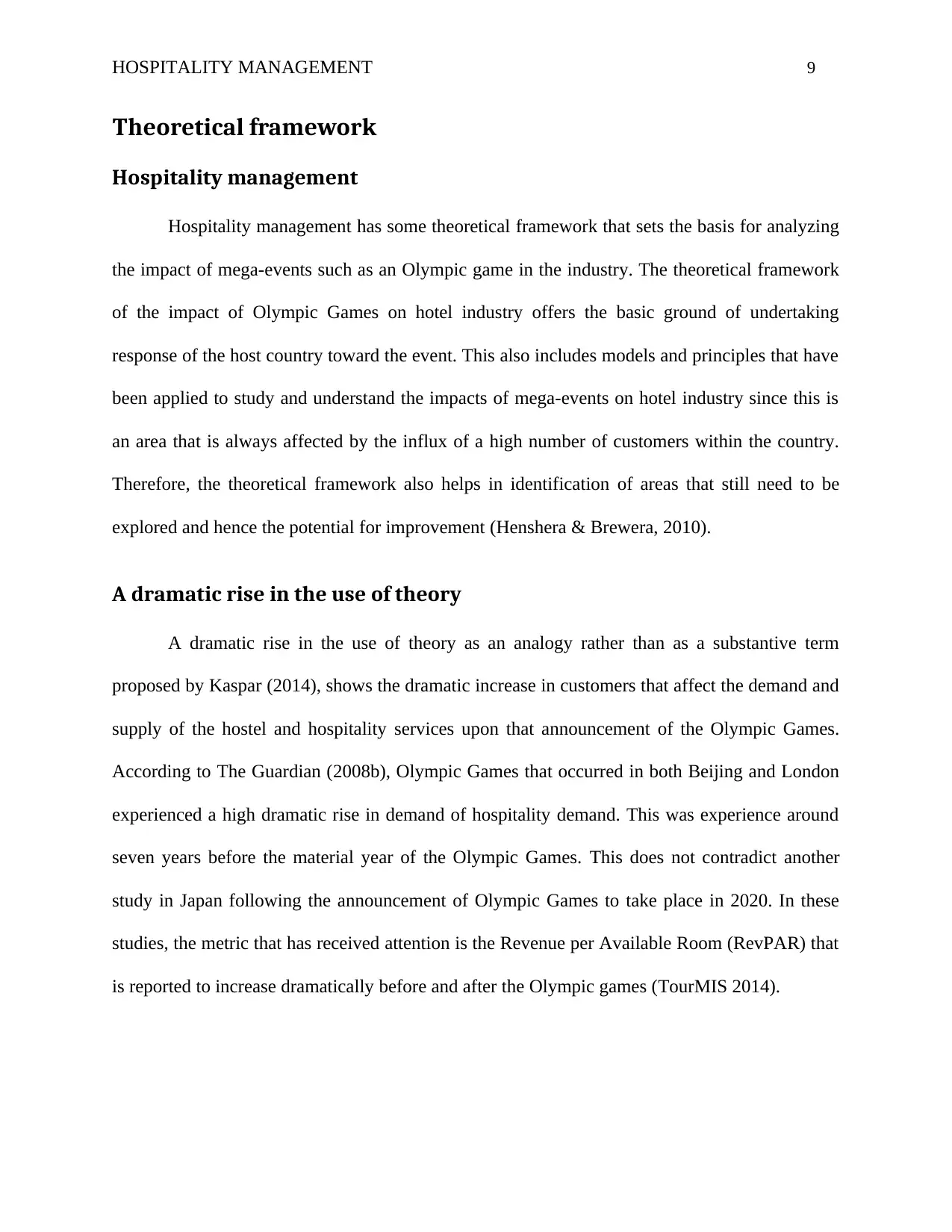
HOSPITALITY MANAGEMENT 9
Theoretical framework
Hospitality management
Hospitality management has some theoretical framework that sets the basis for analyzing
the impact of mega-events such as an Olympic game in the industry. The theoretical framework
of the impact of Olympic Games on hotel industry offers the basic ground of undertaking
response of the host country toward the event. This also includes models and principles that have
been applied to study and understand the impacts of mega-events on hotel industry since this is
an area that is always affected by the influx of a high number of customers within the country.
Therefore, the theoretical framework also helps in identification of areas that still need to be
explored and hence the potential for improvement (Henshera & Brewera, 2010).
A dramatic rise in the use of theory
A dramatic rise in the use of theory as an analogy rather than as a substantive term
proposed by Kaspar (2014), shows the dramatic increase in customers that affect the demand and
supply of the hostel and hospitality services upon that announcement of the Olympic Games.
According to The Guardian (2008b), Olympic Games that occurred in both Beijing and London
experienced a high dramatic rise in demand of hospitality demand. This was experience around
seven years before the material year of the Olympic Games. This does not contradict another
study in Japan following the announcement of Olympic Games to take place in 2020. In these
studies, the metric that has received attention is the Revenue per Available Room (RevPAR) that
is reported to increase dramatically before and after the Olympic games (TourMIS 2014).
Theoretical framework
Hospitality management
Hospitality management has some theoretical framework that sets the basis for analyzing
the impact of mega-events such as an Olympic game in the industry. The theoretical framework
of the impact of Olympic Games on hotel industry offers the basic ground of undertaking
response of the host country toward the event. This also includes models and principles that have
been applied to study and understand the impacts of mega-events on hotel industry since this is
an area that is always affected by the influx of a high number of customers within the country.
Therefore, the theoretical framework also helps in identification of areas that still need to be
explored and hence the potential for improvement (Henshera & Brewera, 2010).
A dramatic rise in the use of theory
A dramatic rise in the use of theory as an analogy rather than as a substantive term
proposed by Kaspar (2014), shows the dramatic increase in customers that affect the demand and
supply of the hostel and hospitality services upon that announcement of the Olympic Games.
According to The Guardian (2008b), Olympic Games that occurred in both Beijing and London
experienced a high dramatic rise in demand of hospitality demand. This was experience around
seven years before the material year of the Olympic Games. This does not contradict another
study in Japan following the announcement of Olympic Games to take place in 2020. In these
studies, the metric that has received attention is the Revenue per Available Room (RevPAR) that
is reported to increase dramatically before and after the Olympic games (TourMIS 2014).
⊘ This is a preview!⊘
Do you want full access?
Subscribe today to unlock all pages.

Trusted by 1+ million students worldwide
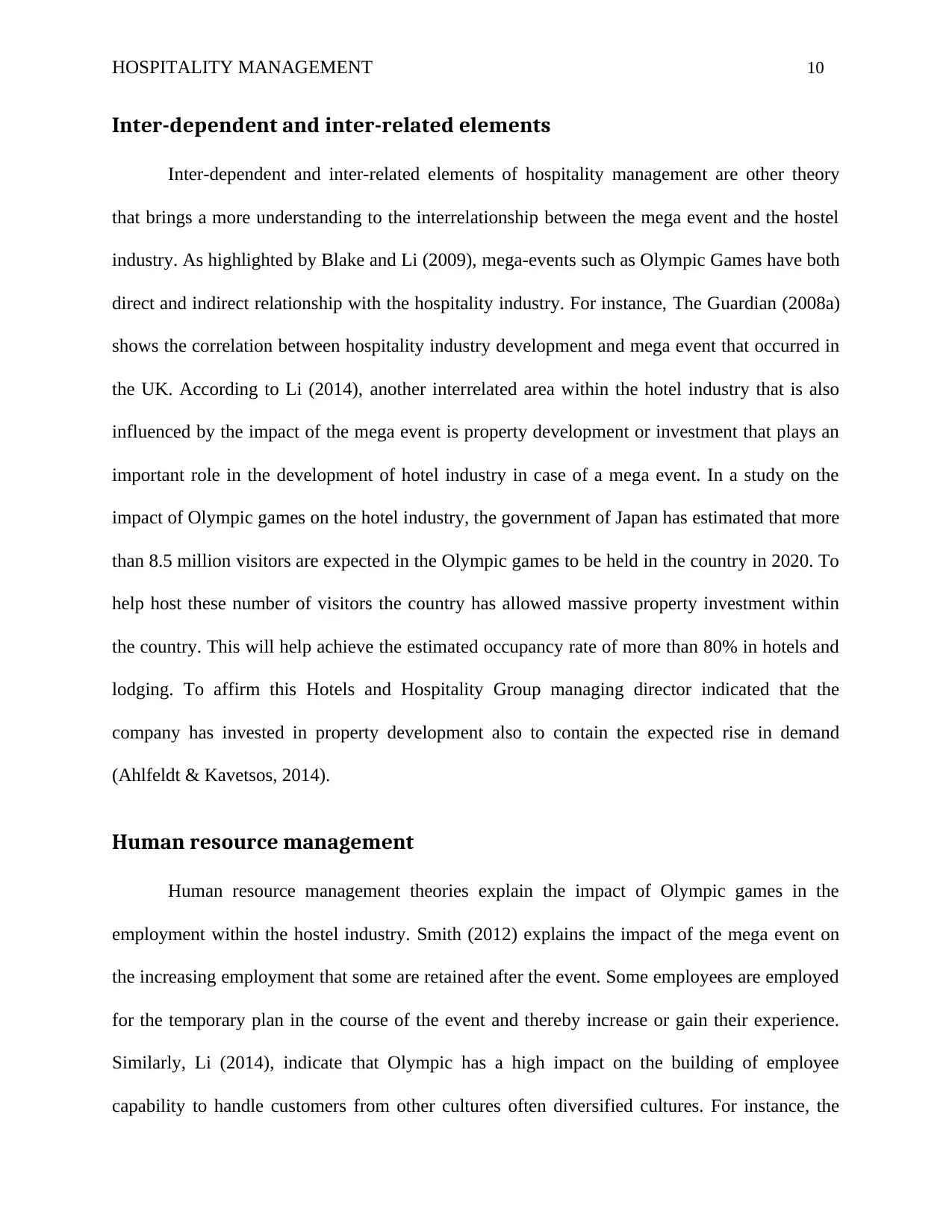
HOSPITALITY MANAGEMENT 10
Inter-dependent and inter-related elements
Inter-dependent and inter-related elements of hospitality management are other theory
that brings a more understanding to the interrelationship between the mega event and the hostel
industry. As highlighted by Blake and Li (2009), mega-events such as Olympic Games have both
direct and indirect relationship with the hospitality industry. For instance, The Guardian (2008a)
shows the correlation between hospitality industry development and mega event that occurred in
the UK. According to Li (2014), another interrelated area within the hotel industry that is also
influenced by the impact of the mega event is property development or investment that plays an
important role in the development of hotel industry in case of a mega event. In a study on the
impact of Olympic games on the hotel industry, the government of Japan has estimated that more
than 8.5 million visitors are expected in the Olympic games to be held in the country in 2020. To
help host these number of visitors the country has allowed massive property investment within
the country. This will help achieve the estimated occupancy rate of more than 80% in hotels and
lodging. To affirm this Hotels and Hospitality Group managing director indicated that the
company has invested in property development also to contain the expected rise in demand
(Ahlfeldt & Kavetsos, 2014).
Human resource management
Human resource management theories explain the impact of Olympic games in the
employment within the hostel industry. Smith (2012) explains the impact of the mega event on
the increasing employment that some are retained after the event. Some employees are employed
for the temporary plan in the course of the event and thereby increase or gain their experience.
Similarly, Li (2014), indicate that Olympic has a high impact on the building of employee
capability to handle customers from other cultures often diversified cultures. For instance, the
Inter-dependent and inter-related elements
Inter-dependent and inter-related elements of hospitality management are other theory
that brings a more understanding to the interrelationship between the mega event and the hostel
industry. As highlighted by Blake and Li (2009), mega-events such as Olympic Games have both
direct and indirect relationship with the hospitality industry. For instance, The Guardian (2008a)
shows the correlation between hospitality industry development and mega event that occurred in
the UK. According to Li (2014), another interrelated area within the hotel industry that is also
influenced by the impact of the mega event is property development or investment that plays an
important role in the development of hotel industry in case of a mega event. In a study on the
impact of Olympic games on the hotel industry, the government of Japan has estimated that more
than 8.5 million visitors are expected in the Olympic games to be held in the country in 2020. To
help host these number of visitors the country has allowed massive property investment within
the country. This will help achieve the estimated occupancy rate of more than 80% in hotels and
lodging. To affirm this Hotels and Hospitality Group managing director indicated that the
company has invested in property development also to contain the expected rise in demand
(Ahlfeldt & Kavetsos, 2014).
Human resource management
Human resource management theories explain the impact of Olympic games in the
employment within the hostel industry. Smith (2012) explains the impact of the mega event on
the increasing employment that some are retained after the event. Some employees are employed
for the temporary plan in the course of the event and thereby increase or gain their experience.
Similarly, Li (2014), indicate that Olympic has a high impact on the building of employee
capability to handle customers from other cultures often diversified cultures. For instance, the
Paraphrase This Document
Need a fresh take? Get an instant paraphrase of this document with our AI Paraphraser
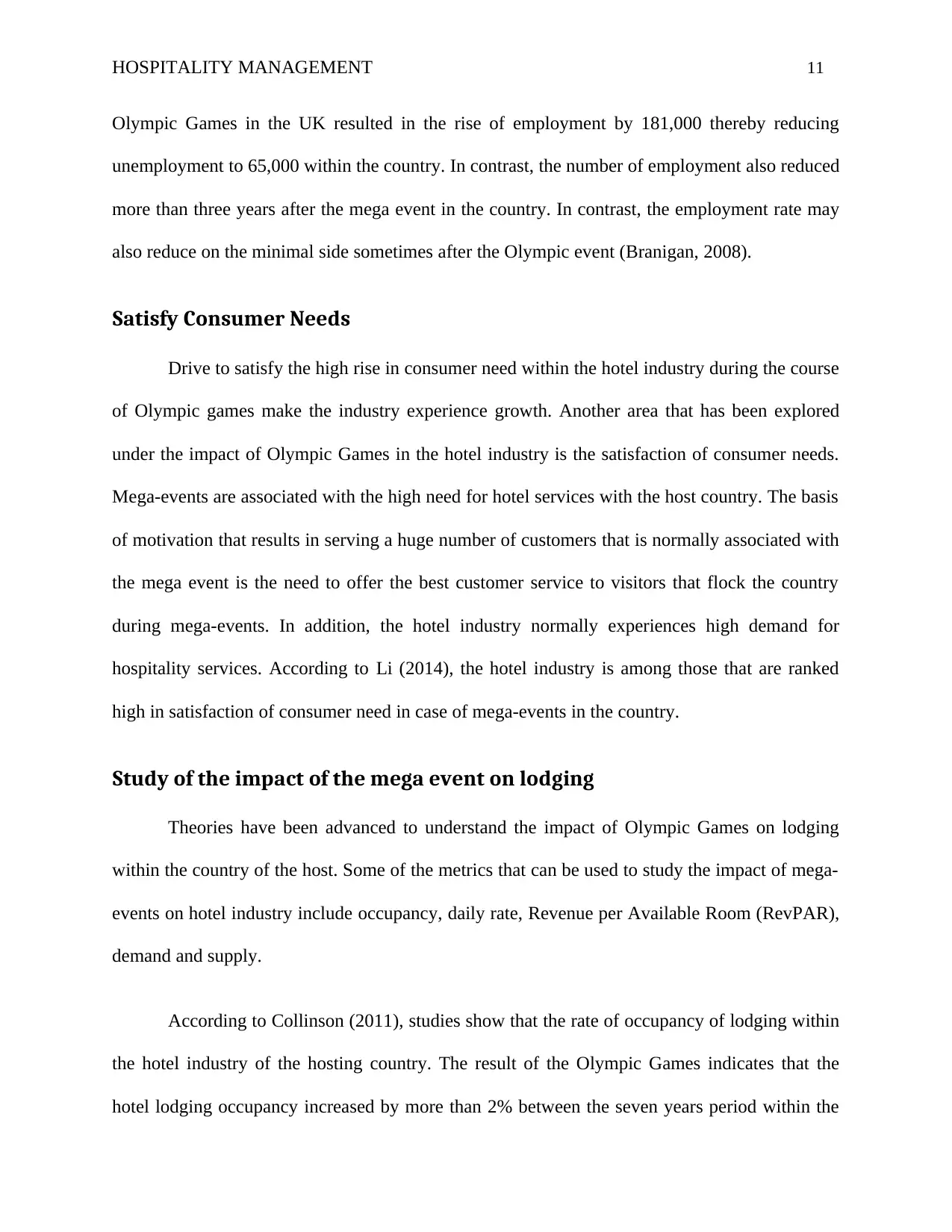
HOSPITALITY MANAGEMENT 11
Olympic Games in the UK resulted in the rise of employment by 181,000 thereby reducing
unemployment to 65,000 within the country. In contrast, the number of employment also reduced
more than three years after the mega event in the country. In contrast, the employment rate may
also reduce on the minimal side sometimes after the Olympic event (Branigan, 2008).
Satisfy Consumer Needs
Drive to satisfy the high rise in consumer need within the hotel industry during the course
of Olympic games make the industry experience growth. Another area that has been explored
under the impact of Olympic Games in the hotel industry is the satisfaction of consumer needs.
Mega-events are associated with the high need for hotel services with the host country. The basis
of motivation that results in serving a huge number of customers that is normally associated with
the mega event is the need to offer the best customer service to visitors that flock the country
during mega-events. In addition, the hotel industry normally experiences high demand for
hospitality services. According to Li (2014), the hotel industry is among those that are ranked
high in satisfaction of consumer need in case of mega-events in the country.
Study of the impact of the mega event on lodging
Theories have been advanced to understand the impact of Olympic Games on lodging
within the country of the host. Some of the metrics that can be used to study the impact of mega-
events on hotel industry include occupancy, daily rate, Revenue per Available Room (RevPAR),
demand and supply.
According to Collinson (2011), studies show that the rate of occupancy of lodging within
the hotel industry of the hosting country. The result of the Olympic Games indicates that the
hotel lodging occupancy increased by more than 2% between the seven years period within the
Olympic Games in the UK resulted in the rise of employment by 181,000 thereby reducing
unemployment to 65,000 within the country. In contrast, the number of employment also reduced
more than three years after the mega event in the country. In contrast, the employment rate may
also reduce on the minimal side sometimes after the Olympic event (Branigan, 2008).
Satisfy Consumer Needs
Drive to satisfy the high rise in consumer need within the hotel industry during the course
of Olympic games make the industry experience growth. Another area that has been explored
under the impact of Olympic Games in the hotel industry is the satisfaction of consumer needs.
Mega-events are associated with the high need for hotel services with the host country. The basis
of motivation that results in serving a huge number of customers that is normally associated with
the mega event is the need to offer the best customer service to visitors that flock the country
during mega-events. In addition, the hotel industry normally experiences high demand for
hospitality services. According to Li (2014), the hotel industry is among those that are ranked
high in satisfaction of consumer need in case of mega-events in the country.
Study of the impact of the mega event on lodging
Theories have been advanced to understand the impact of Olympic Games on lodging
within the country of the host. Some of the metrics that can be used to study the impact of mega-
events on hotel industry include occupancy, daily rate, Revenue per Available Room (RevPAR),
demand and supply.
According to Collinson (2011), studies show that the rate of occupancy of lodging within
the hotel industry of the hosting country. The result of the Olympic Games indicates that the
hotel lodging occupancy increased by more than 2% between the seven years period within the
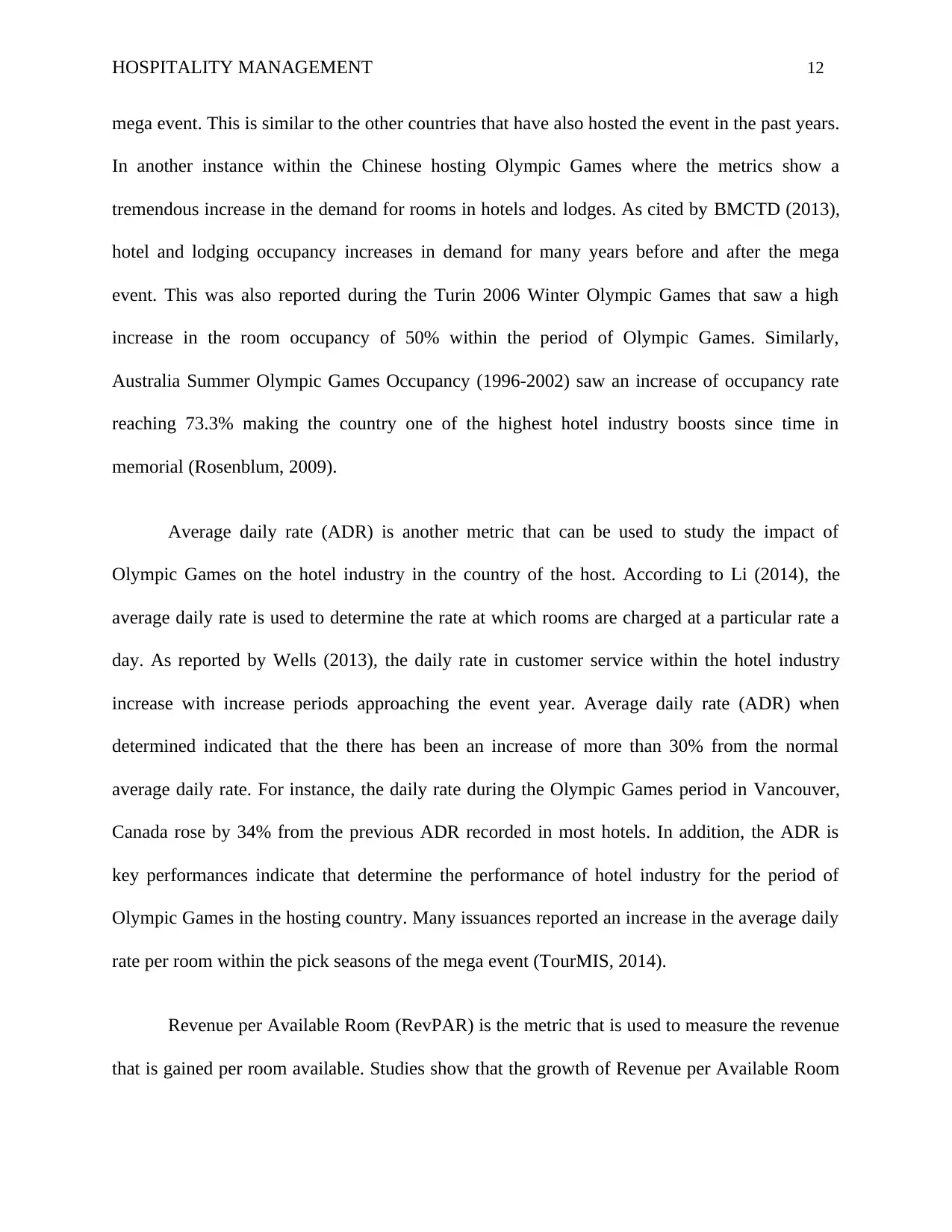
HOSPITALITY MANAGEMENT 12
mega event. This is similar to the other countries that have also hosted the event in the past years.
In another instance within the Chinese hosting Olympic Games where the metrics show a
tremendous increase in the demand for rooms in hotels and lodges. As cited by BMCTD (2013),
hotel and lodging occupancy increases in demand for many years before and after the mega
event. This was also reported during the Turin 2006 Winter Olympic Games that saw a high
increase in the room occupancy of 50% within the period of Olympic Games. Similarly,
Australia Summer Olympic Games Occupancy (1996-2002) saw an increase of occupancy rate
reaching 73.3% making the country one of the highest hotel industry boosts since time in
memorial (Rosenblum, 2009).
Average daily rate (ADR) is another metric that can be used to study the impact of
Olympic Games on the hotel industry in the country of the host. According to Li (2014), the
average daily rate is used to determine the rate at which rooms are charged at a particular rate a
day. As reported by Wells (2013), the daily rate in customer service within the hotel industry
increase with increase periods approaching the event year. Average daily rate (ADR) when
determined indicated that the there has been an increase of more than 30% from the normal
average daily rate. For instance, the daily rate during the Olympic Games period in Vancouver,
Canada rose by 34% from the previous ADR recorded in most hotels. In addition, the ADR is
key performances indicate that determine the performance of hotel industry for the period of
Olympic Games in the hosting country. Many issuances reported an increase in the average daily
rate per room within the pick seasons of the mega event (TourMIS, 2014).
Revenue per Available Room (RevPAR) is the metric that is used to measure the revenue
that is gained per room available. Studies show that the growth of Revenue per Available Room
mega event. This is similar to the other countries that have also hosted the event in the past years.
In another instance within the Chinese hosting Olympic Games where the metrics show a
tremendous increase in the demand for rooms in hotels and lodges. As cited by BMCTD (2013),
hotel and lodging occupancy increases in demand for many years before and after the mega
event. This was also reported during the Turin 2006 Winter Olympic Games that saw a high
increase in the room occupancy of 50% within the period of Olympic Games. Similarly,
Australia Summer Olympic Games Occupancy (1996-2002) saw an increase of occupancy rate
reaching 73.3% making the country one of the highest hotel industry boosts since time in
memorial (Rosenblum, 2009).
Average daily rate (ADR) is another metric that can be used to study the impact of
Olympic Games on the hotel industry in the country of the host. According to Li (2014), the
average daily rate is used to determine the rate at which rooms are charged at a particular rate a
day. As reported by Wells (2013), the daily rate in customer service within the hotel industry
increase with increase periods approaching the event year. Average daily rate (ADR) when
determined indicated that the there has been an increase of more than 30% from the normal
average daily rate. For instance, the daily rate during the Olympic Games period in Vancouver,
Canada rose by 34% from the previous ADR recorded in most hotels. In addition, the ADR is
key performances indicate that determine the performance of hotel industry for the period of
Olympic Games in the hosting country. Many issuances reported an increase in the average daily
rate per room within the pick seasons of the mega event (TourMIS, 2014).
Revenue per Available Room (RevPAR) is the metric that is used to measure the revenue
that is gained per room available. Studies show that the growth of Revenue per Available Room
⊘ This is a preview!⊘
Do you want full access?
Subscribe today to unlock all pages.

Trusted by 1+ million students worldwide
1 out of 24
Related Documents
Your All-in-One AI-Powered Toolkit for Academic Success.
+13062052269
info@desklib.com
Available 24*7 on WhatsApp / Email
![[object Object]](/_next/static/media/star-bottom.7253800d.svg)
Unlock your academic potential
Copyright © 2020–2026 A2Z Services. All Rights Reserved. Developed and managed by ZUCOL.





